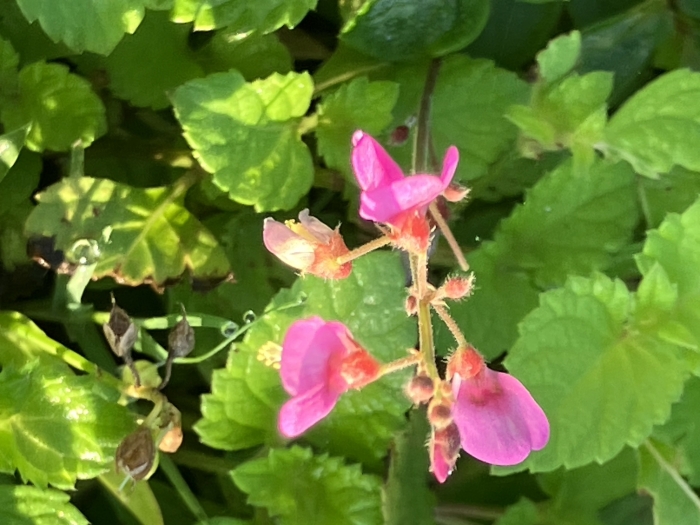Creeping Beggarweed
(Desmodium incanum)
Creeping Beggarweed (Desmodium incanum)
/
/

© Eldritch
CC BY 4.0
Image By:
© Eldritch
Recorded By:
Copyright:
CC BY 4.0
Copyright Notice:
Photo by: © Eldritch | License Type: CC BY 4.0 | License URL: http://creativecommons.org/licenses/by/4.0/ | Uploader: eldritchsleuth | Publisher: iNaturalist |

























Estimated Native Range
Summary
Desmodium incanum, commonly known as creeping beggarweed or Spanish clover, is a perennial herb that is native to tropical and subtropical open woodlands and grasslands of Central and South America. It has adapted to a wide range of habitats, including disturbed areas and roadsides. This plant typically grows to a height of 1-2 feet (30-60 cm) and can spread widely with its branched runners that facilitate vegetative reproduction. The leaves of Desmodium incanum are trifoliate, with each leaflet being elliptic and covered in fine hairs. From summer to early fall, it produces small, showy clusters of pink to rose flowers, followed by seedpods that are covered in sticky hairs, which can attach to animals and clothing, aiding in the plant’s dispersal.
Creeping beggarweed is valued for its ability to fix nitrogen in the soil, making it useful in improving soil fertility. It is also used as a ground cover and for erosion control in tropical and subtropical regions. In cultivation, it prefers full sun to partial shade and requires well-drained soils. While it is drought-tolerant once established, it benefits from moderate watering. However, gardeners should be cautious as Desmodium incanum can become invasive outside its native range, spreading aggressively and outcompeting native vegetation. It is also known to host nematodes that can affect other plants.CC BY-SA 4.0
Creeping beggarweed is valued for its ability to fix nitrogen in the soil, making it useful in improving soil fertility. It is also used as a ground cover and for erosion control in tropical and subtropical regions. In cultivation, it prefers full sun to partial shade and requires well-drained soils. While it is drought-tolerant once established, it benefits from moderate watering. However, gardeners should be cautious as Desmodium incanum can become invasive outside its native range, spreading aggressively and outcompeting native vegetation. It is also known to host nematodes that can affect other plants.CC BY-SA 4.0
Plant Description
- Plant Type: Shrub, Herb
- Height: 1-3 feet
- Width: 2-4 feet
- Growth Rate: Moderate
- Flower Color: Pink, Purple
- Flowering Season: Summer, Fall
- Leaf Retention: Deciduous
Growth Requirements
- Sun: Full Sun, Part Shade
- Water: Medium
- Drainage: Medium
Common Uses
Butterfly Garden, Erosion Control, Low Maintenance
Natural Habitat
Native to tropical and subtropical open woodlands and grasslands
Other Names
Common Names: Spanish clover, Zarzabacoa comun, Amor-De-Campo, Carrapicho-Beiço-De-Boi, Kaimi-Clover, Creeping beggarweed
Scientific Names: , Desmodium incanum, Aeschynomene incana, Aeschynomene spicata, Desmodium ancistrocarpum, Desmodium canum, Desmodium canum, Desmodium diversifolium, Desmodium diversifolium, Desmodium frutescens
GBIF Accepted Name: